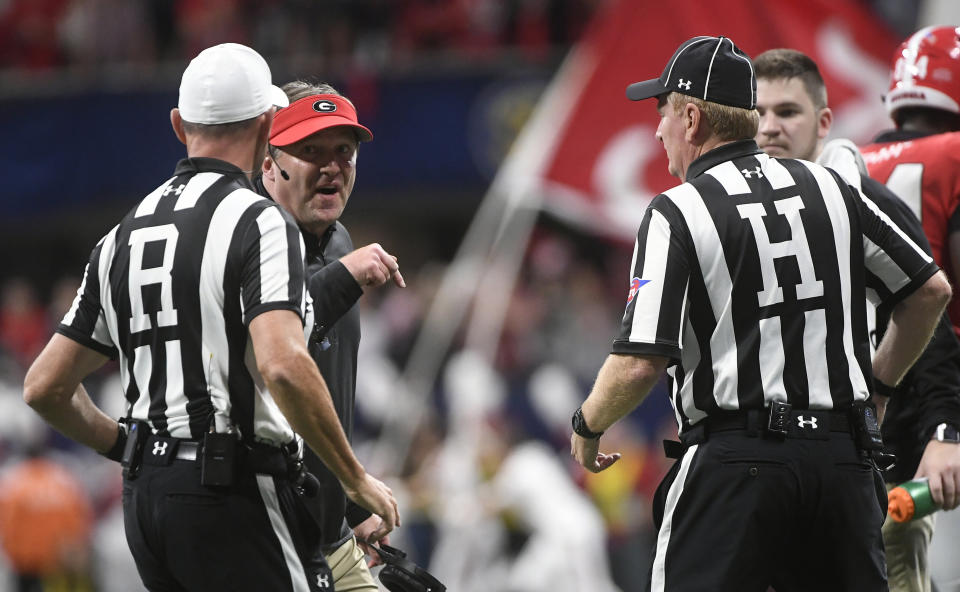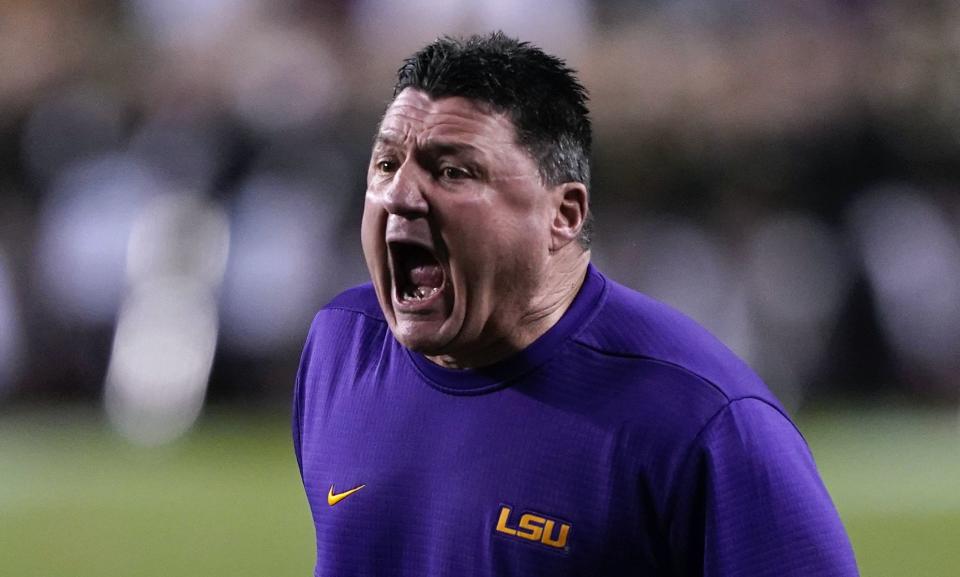Why the SEC wants to talk more about officiating

DESTIN, Fla. — At 6 a.m. on Sunday morning, Nov. 25, 2018, an irate Ed Orgeron reached for his cell phone and punched in a call to Steve Shaw.
Shaw, the Southeastern Conference supervisor of officiating, took the call and listened to the LSU football coach vent. The night before, Orgeron’s Tigers had lost one of the wildest games ever played: a five-hour, seven-overtime fandango against Texas A&M that was steeped in controversy. The game seemed destined to end in regulation as an LSU victory, but an Aggies touchdown with no time remaining capped a drive that was rife with questionable calls.
By the next morning, Orgeron was ready to engage in the SEC’s second-favorite sport — the Blame Game.
“I was angry,” Orgeron said. “[Shaw] answered my call and he was good. … We spoke several times that day. There were several things I wanted to talk about.”
“We had good conversations,” Shaw confirmed here Thursday, smiling.
Whether it’s a coach calling the league supervisor of officials or fans poring over game video like criminal investigators, this is how autumn Sundays and Mondays unfold — not just in the SEC, but around college football. Ripping the refs has become as ingrained within the sport as tailgating and trash talking. Bad and borderline calls take on lives of their own, with conspiracy theories spreading and growing like kudzu.
With college football officiating being cussed and discussed like never before, the SEC is doing several things about it. The league paid DeLoitte to conduct an external review, which included a thorough analytics dive on statistical trends. It had eight officials here to meet with football coaches. And it is contemplating ways to communicate more with the public about its officials and their work.
Yes, the SEC is looking for methods to add to the noise. Is this really a good idea?

America’s ref obsession
One of the topics of discussion here at SEC spring meetings has been the league mulling more discussion about particularly controversial officiating calls. Commissioner Greg Sankey mentioned an attempt to “engage better on game day” in terms of correcting misinformation pertaining to a call. He also mentioned the possibility of someone — likely Shaw — appearing on the SEC Network to go over controversial calls and why they were made.
Transparency is good. Open communication is good. But if the Steve Shaw Variety Hour becomes a Monday SEC Network programming staple, we could be reaching the point of talking too much about officiating.
Really, we’ve already gotten to the point of talking too much about it. That’s why every network has a former ref on staff to put on broadcasts and examine replays of close calls. That’s why Fox Sports’ Mike Pereira — the pioneer of the Televised Ref Expert genre — has nearly 300,000 Twitter followers.
America’s ref obsession is real. In our complainer culture, a decreasing number of fans can accept their team losing fair and square without trying to blame the defeat on inept/corrupt officials. Ask college sports fans nationwide, and everyone is convinced their league has the worst officiating.
It’s a loser mentality and a massive expenditure of misspent energy, but it exists and may well be spreading.
The sentiment behind creating even more communication about the refs — correcting misinformation and, undoubtedly, defending the SEC refs — is understandable. Someone with scant knowledge of the rules feeds a complaint about a blown call or series of calls into the social-media machinery — complete with Zapruder Film evidence — and it goes viral. Then come the complaints of bias, league favoritism for certain teams, refs with sinister motives. A small army mobilizes (perhaps led by, oh, James Carville) and the conference office is under virtual siege.
“If we remain silent, someone else defines the narrative,” Shaw said during a very informative, 90-minute officiating seminar. “Officiating has always been in a no-comment world. I’m not sure the commissioner believes we can still live in a no-comment world.”
Sankey said here this week about officiating, “Perception can be reality.” Clearly, he’s interested in owning the perception space.
Pitfalls of talking about officiating
But perpetually fighting a perception battle can become its own reality, too, and an equally large outlay of misspent energy on the part of the league office. Institutionally extending the news cycle of, say, a questionable pass interference call (or no-call) doesn’t seem like a great plan. There is something to be said for taking the inevitable heat and moving on.
And here is the potential Steve Shaw Variety Hour conundrum: if it’s nothing but a blanket defense of SEC refs, that would only heighten the criticism; if he’s calling out errors, that might heighten the criticism as well.
Shaw acknowledged that the “tipping point” for the SEC’s change to a more public stance regarding officiating was that seven-OT game between LSU and A&M. Media reports pilloried the SEC refs from that game, including one in particular from the Baton Rouge Advocate that spurred Shaw to address the criticism. He maintained, credibly, that every alleged missed call in the final minute of regulation was ultimately proven to be correct, and really took issue only with a pass interference call against LSU during one of the overtime periods.
The feedback from that endeavor to speak with the Advocate was positive enough that the SEC is now preparing to talk a whole lot more about its officiating.
Overall, SEC officiating is demonstrably better than most conferences in college football, and arguably the best. But it’s by no means perfect, which means there is turnover. Shaw said the league lost one ref to the NFL during this offseason and had seven other positions turn over — he declined to enumerate how many were voluntary retirements and how many were cut for persistently poor performance grades.
But Shaw also acknowledged that it’s progressively harder to find qualified young people who want to get into officiating. Who wants to endure that kind of abuse?
“There’s a crisis in officiating,” he said. “The idea of guys not wanting to get into the game … is impacting us. … It is a game of numbers that will eventually hit [the SEC]. Where we are today, our pipeline is full. It will not affect us in the short window, but in the long window, it will.”
Maybe just get over it?
It’s probably impossible to change the complainer culture that adheres itself to sports, but maybe coaches in the SEC and around college athletics could take a cue from Auburn basketball coach Bruce Pearl. The Tigers all but had their Final Four semifinal won against Virginia in April before a controversial no-call and a controversial call in the final 10 seconds aided a stunning Cavaliers comeback win.
The Auburn faithful in Minneapolis were apoplectic. Pearl’s son and assistant coach, Steven, started after the official who made the foul call after the final horn, screaming. Pearl himself was none too pleased.
But by the time he reached the postgame interview, after a crushing loss in the biggest basketball game in Auburn history, the coach resolutely refused to rip the refs.
“It was a football stadium, so I had a long walk from the court to the locker room,” Pearl said this week. “That walk enabled me to give some thought to how I was going to handle a very upset locker room. There’s a responsibility to handle it a certain way.”
Pearl’s message to his team was the same as it was to the media. We’re not leaving here blaming the refs.
“We try to teach our kids to go on to the next play,” Pearl said. “We look really hard at what we can control. To whine in defeat is not going to do that.”
Whining in defeat has become the American Way. We already talk too much about officiating. The SEC’s well-meaning but hazardous plan to talk about it more isn’t likely to help.
More from Yahoo Sports:

 Yahoo Sports
Yahoo Sports 